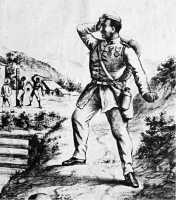 It would be a supreme fantasy to think, naively, that we can fully recognize the black blood that lies beneath the foundations of nation-empires and post-empires if we also leave in place the very stones that sustain and adorn the idea of the nation.
It would be a supreme fantasy to think, naively, that we can fully recognize the black blood that lies beneath the foundations of nation-empires and post-empires if we also leave in place the very stones that sustain and adorn the idea of the nation.
28.01.2020 | by Bruno Sena Martins
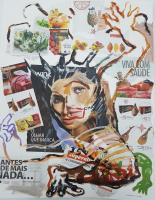 We urgently need a return to culture as the filter between individuals and the political, broadly conceived. Without this we will not escape from the current situation that, not only in Italy, finds its reflection in the protagonist of Paolo Sorrentino’s acclaimed La Grande Bellezza: the tragic, failed, mundane visage of Jep Gambardella.
We urgently need a return to culture as the filter between individuals and the political, broadly conceived. Without this we will not escape from the current situation that, not only in Italy, finds its reflection in the protagonist of Paolo Sorrentino’s acclaimed La Grande Bellezza: the tragic, failed, mundane visage of Jep Gambardella.
28.01.2020 | by Lívia Apa
 In France, in spite of the economic context of the Trente Glorieuses being favourable to the absorption of labour, the socioprofessional characteristics of the French people who arrived from Algeria did not correspond to the needs of the French labour market, which required industrially qualified workers. In the Portuguese case the inverse situation pertained.
In France, in spite of the economic context of the Trente Glorieuses being favourable to the absorption of labour, the socioprofessional characteristics of the French people who arrived from Algeria did not correspond to the needs of the French labour market, which required industrially qualified workers. In the Portuguese case the inverse situation pertained.
02.01.2020 | by Morgane Delaunay
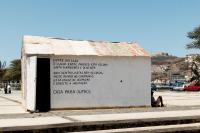 What is at stake in Djaimilia Pereira de Almeida’s book are the living, human ruins of empire. No longer based on the figure of the veteran or the returnee, but on someone from the other side of the line colonialism traced: a black man and, in this case, the complex figure that colonialism generated, the assimilated African who, here, for the first time in Portuguese literature, is at the centre of the narrative.
What is at stake in Djaimilia Pereira de Almeida’s book are the living, human ruins of empire. No longer based on the figure of the veteran or the returnee, but on someone from the other side of the line colonialism traced: a black man and, in this case, the complex figure that colonialism generated, the assimilated African who, here, for the first time in Portuguese literature, is at the centre of the narrative.
26.12.2019 | by Margarida Calafate Ribeiro
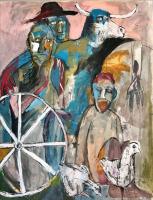 The construction of postmemory is a complex process which may take place in very different ways and, as is worth repeating, is never simply based on transmission, but, rather, implies an active positioning, a decision, on the part of members of a second generation. Such a decision is never simply played out at a strictly rational level, it inevitably presupposes a high degree of emotional involvement.
The construction of postmemory is a complex process which may take place in very different ways and, as is worth repeating, is never simply based on transmission, but, rather, implies an active positioning, a decision, on the part of members of a second generation. Such a decision is never simply played out at a strictly rational level, it inevitably presupposes a high degree of emotional involvement.
30.11.2019 | by António Sousa Ribeiro
 Historian Marissa Moorman wrote an important book about radio and modern state power. "Only radio receivers can feel radio waves. But people feel radio. Radio, Moorman reminds us, courses through our lives everywhere we go and alongside everything we do."
Historian Marissa Moorman wrote an important book about radio and modern state power. "Only radio receivers can feel radio waves. But people feel radio. Radio, Moorman reminds us, courses through our lives everywhere we go and alongside everything we do."
15.11.2019 | by Jesse Bucher
 ‘The Missing Face’ is a powerful reflection on the war, and above all on the ownership of traumatic experiences of conflict, specifically at the end of Portuguese colonialism in Africa.
‘The Missing Face’ is a powerful reflection on the war, and above all on the ownership of traumatic experiences of conflict, specifically at the end of Portuguese colonialism in Africa.
12.11.2019 | by Felipe Cammaert
 Museums are democratising, inclusive and polyphonic spaces for critical dialogue about the pasts and the futures. Acknowledging and addressing the conflicts and challenges of the present, they hold artefacts and specimens in trust for society, safeguard diverse memories for future generations and guarantee equal rights and equal access to heritage for all people.
Museums are democratising, inclusive and polyphonic spaces for critical dialogue about the pasts and the futures. Acknowledging and addressing the conflicts and challenges of the present, they hold artefacts and specimens in trust for society, safeguard diverse memories for future generations and guarantee equal rights and equal access to heritage for all people.
07.11.2019 | by António Pinto Ribeiro
 One that stands in contrast to the government’s disregard for democratic procedure – even as it claims to be pushing on the “people’s will” – was the publication of a book by University College London’ Press, with the title of The Responsibility of Intellectuals: Reflections by Noam Chomsky and others after 50 years.
One that stands in contrast to the government’s disregard for democratic procedure – even as it claims to be pushing on the “people’s will” – was the publication of a book by University College London’ Press, with the title of The Responsibility of Intellectuals: Reflections by Noam Chomsky and others after 50 years.
01.10.2019 | by Paulo de Medeiros
 These visible and invisible movements, transparent or subterranean, brought a new vision of black cultural presence to the world in places far beyond Africa. They brought, too, a new perspective on an African continent. Portugal, which had historically opened its doors to the first waves of globalization, was looking to the future with realism and with desire.
These visible and invisible movements, transparent or subterranean, brought a new vision of black cultural presence to the world in places far beyond Africa. They brought, too, a new perspective on an African continent. Portugal, which had historically opened its doors to the first waves of globalization, was looking to the future with realism and with desire.
01.10.2019 | by Margarida Calafate Ribeiro
 Next Future ended by opening up to the future, with a nod towards a Europe and a Eurocentrism which has hardly considered African and Latin American comic books, crime writing, science fiction or visual animation. A challenge to museums and virtual exhibitions was launched with the project-exhibition Unplace – Networked Art: Places-Between-Places.
Next Future ended by opening up to the future, with a nod towards a Europe and a Eurocentrism which has hardly considered African and Latin American comic books, crime writing, science fiction or visual animation. A challenge to museums and virtual exhibitions was launched with the project-exhibition Unplace – Networked Art: Places-Between-Places.
01.10.2019 | by Margarida Calafate Ribeiro
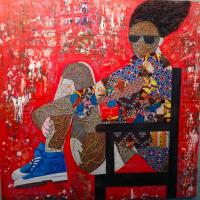 The regenerative pillars of society: in order to regenerate, to ill, to let something healthy grow again, we need democratic participation, environmental sustainability, social inclusion, and cultural diversity. These would be the main political goals. The cognitive tools to walk this way are critical thinking, artistic creativity, ethical technology and… that’s my point, the transformative power of media.
The regenerative pillars of society: in order to regenerate, to ill, to let something healthy grow again, we need democratic participation, environmental sustainability, social inclusion, and cultural diversity. These would be the main political goals. The cognitive tools to walk this way are critical thinking, artistic creativity, ethical technology and… that’s my point, the transformative power of media.
25.08.2019 | by Carla Baptista
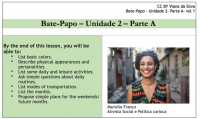 ‘openness’ means listening to the language of a given community and the commitment to reproduce it in a textbook format. Inclusion of minority groups in the textbook is perceived not as ‘curiosities’, but as an integral part of the cultures being represented so that a wider range of communities and language registers (from formal to informal) is portrayed. In addition, openness applies to the articulation of gender narratives in an inclusionary format. For instance, the masculine gender is supplemented with female and other non-binary genders.
‘openness’ means listening to the language of a given community and the commitment to reproduce it in a textbook format. Inclusion of minority groups in the textbook is perceived not as ‘curiosities’, but as an integral part of the cultures being represented so that a wider range of communities and language registers (from formal to informal) is portrayed. In addition, openness applies to the articulation of gender narratives in an inclusionary format. For instance, the masculine gender is supplemented with female and other non-binary genders.
23.08.2019 | by Carlos Pio and Eduardo Viana da Silva
 Continuing to insist on a colour-blind policy, ignoring the voices of Invisible Portuguese, will only maintain the ‘specific and extremely dangerous delusion made possible by the wilful forgetting, and negating, of Europe’s imperial past.
Continuing to insist on a colour-blind policy, ignoring the voices of Invisible Portuguese, will only maintain the ‘specific and extremely dangerous delusion made possible by the wilful forgetting, and negating, of Europe’s imperial past.
29.07.2019 | by Hélia Santos
 Some of these stories also show that such ‘returns’ to Angola by people of Nuno’s generation may actually be critical detours, when they give rise, upon returning to Portugal, to critical postures on the colonial persistence within Portuguese society. In this European context, could the Portuguese case represent an alternative: something that, through a post-colonial journey, may lead to a more egalitarian society that accepts a plural public retelling of the past?
Some of these stories also show that such ‘returns’ to Angola by people of Nuno’s generation may actually be critical detours, when they give rise, upon returning to Portugal, to critical postures on the colonial persistence within Portuguese society. In this European context, could the Portuguese case represent an alternative: something that, through a post-colonial journey, may lead to a more egalitarian society that accepts a plural public retelling of the past?
29.07.2019 | by Irène dos Santos
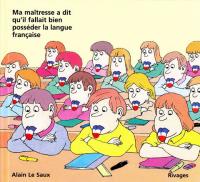 Reflecting on glotophobia also allows us to question the linguistic and cultural imaginaries of a
post-colonial or decolonial perspective. We must rethink, again, discourses that rely on a political or
ideological territorialisation sustained by references to the purity of origin, of language, of religion, or of
ideological dogma.
Reflecting on glotophobia also allows us to question the linguistic and cultural imaginaries of a
post-colonial or decolonial perspective. We must rethink, again, discourses that rely on a political or
ideological territorialisation sustained by references to the purity of origin, of language, of religion, or of
ideological dogma.
13.07.2019 | by Graça dos Santos
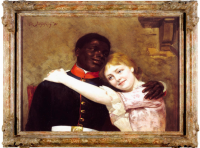 The authors were confronted with the lack of information on the representation of black men and women in European painting, which led them to very direct and immediate questions: who were the people represented? What were the motivations for representing them? And why did black people in European painting rarely have individualized identities?
The authors were confronted with the lack of information on the representation of black men and women in European painting, which led them to very direct and immediate questions: who were the people represented? What were the motivations for representing them? And why did black people in European painting rarely have individualized identities?
10.07.2019 | by Ana Paula Rebelo Correia
 Noting that this subject is now everywhere is to suggest that it has transcended the politico-museological sphere to become part of the public and media space. This is relatively positive, particularly if it is accompanied by actual interventions and insightful debate. Yet the process, which was never going to be straightforward, has become more complex, and acquired new problematics.
Noting that this subject is now everywhere is to suggest that it has transcended the politico-museological sphere to become part of the public and media space. This is relatively positive, particularly if it is accompanied by actual interventions and insightful debate. Yet the process, which was never going to be straightforward, has become more complex, and acquired new problematics.
08.07.2019 | by António Pinto Ribeiro
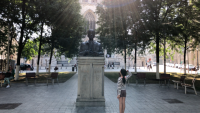 Eurocentric power needs to create narratives about colonial history in order to control interpretations of it. Concepts of law and justice have played an important role in this. Also today, the idea of justice is used to approve violent migratory control policies, including the aggressive persecution, detention, and deportation of persons.
Eurocentric power needs to create narratives about colonial history in order to control interpretations of it. Concepts of law and justice have played an important role in this. Also today, the idea of justice is used to approve violent migratory control policies, including the aggressive persecution, detention, and deportation of persons.
22.06.2019 | by vários
 Why does Europe (still) have such trouble showing a coherent attitude in the face of discourses which legitimate racism and xenophobia? What are the masks that stop it from accepting its colonial past and understanding, once and for all, that diasporas are part of the richness of the European cultural map?
Why does Europe (still) have such trouble showing a coherent attitude in the face of discourses which legitimate racism and xenophobia? What are the masks that stop it from accepting its colonial past and understanding, once and for all, that diasporas are part of the richness of the European cultural map?
22.06.2019 | by Felipe Cammaert
 It would be a supreme fantasy to think, naively, that we can fully recognize the black blood that lies beneath the foundations of nation-empires and post-empires if we also leave in place the very stones that sustain and adorn the idea of the nation.
It would be a supreme fantasy to think, naively, that we can fully recognize the black blood that lies beneath the foundations of nation-empires and post-empires if we also leave in place the very stones that sustain and adorn the idea of the nation.  We urgently need a return to culture as the filter between individuals and the political, broadly conceived. Without this we will not escape from the current situation that, not only in Italy, finds its reflection in the protagonist of Paolo Sorrentino’s acclaimed La Grande Bellezza: the tragic, failed, mundane visage of Jep Gambardella.
We urgently need a return to culture as the filter between individuals and the political, broadly conceived. Without this we will not escape from the current situation that, not only in Italy, finds its reflection in the protagonist of Paolo Sorrentino’s acclaimed La Grande Bellezza: the tragic, failed, mundane visage of Jep Gambardella.  In France, in spite of the economic context of the Trente Glorieuses being favourable to the absorption of labour, the socioprofessional characteristics of the French people who arrived from Algeria did not correspond to the needs of the French labour market, which required industrially qualified workers. In the Portuguese case the inverse situation pertained.
In France, in spite of the economic context of the Trente Glorieuses being favourable to the absorption of labour, the socioprofessional characteristics of the French people who arrived from Algeria did not correspond to the needs of the French labour market, which required industrially qualified workers. In the Portuguese case the inverse situation pertained.  What is at stake in Djaimilia Pereira de Almeida’s book are the living, human ruins of empire. No longer based on the figure of the veteran or the returnee, but on someone from the other side of the line colonialism traced: a black man and, in this case, the complex figure that colonialism generated, the assimilated African who, here, for the first time in Portuguese literature, is at the centre of the narrative.
What is at stake in Djaimilia Pereira de Almeida’s book are the living, human ruins of empire. No longer based on the figure of the veteran or the returnee, but on someone from the other side of the line colonialism traced: a black man and, in this case, the complex figure that colonialism generated, the assimilated African who, here, for the first time in Portuguese literature, is at the centre of the narrative.  The construction of postmemory is a complex process which may take place in very different ways and, as is worth repeating, is never simply based on transmission, but, rather, implies an active positioning, a decision, on the part of members of a second generation. Such a decision is never simply played out at a strictly rational level, it inevitably presupposes a high degree of emotional involvement.
The construction of postmemory is a complex process which may take place in very different ways and, as is worth repeating, is never simply based on transmission, but, rather, implies an active positioning, a decision, on the part of members of a second generation. Such a decision is never simply played out at a strictly rational level, it inevitably presupposes a high degree of emotional involvement.  Historian Marissa Moorman wrote an important book about radio and modern state power. "Only radio receivers can feel radio waves. But people feel radio. Radio, Moorman reminds us, courses through our lives everywhere we go and alongside everything we do."
Historian Marissa Moorman wrote an important book about radio and modern state power. "Only radio receivers can feel radio waves. But people feel radio. Radio, Moorman reminds us, courses through our lives everywhere we go and alongside everything we do."  ‘The Missing Face’ is a powerful reflection on the war, and above all on the ownership of traumatic experiences of conflict, specifically at the end of Portuguese colonialism in Africa.
‘The Missing Face’ is a powerful reflection on the war, and above all on the ownership of traumatic experiences of conflict, specifically at the end of Portuguese colonialism in Africa.  Museums are democratising, inclusive and polyphonic spaces for critical dialogue about the pasts and the futures. Acknowledging and addressing the conflicts and challenges of the present, they hold artefacts and specimens in trust for society, safeguard diverse memories for future generations and guarantee equal rights and equal access to heritage for all people.
Museums are democratising, inclusive and polyphonic spaces for critical dialogue about the pasts and the futures. Acknowledging and addressing the conflicts and challenges of the present, they hold artefacts and specimens in trust for society, safeguard diverse memories for future generations and guarantee equal rights and equal access to heritage for all people.  One that stands in contrast to the government’s disregard for democratic procedure – even as it claims to be pushing on the “people’s will” – was the publication of a book by University College London’ Press, with the title of The Responsibility of Intellectuals: Reflections by Noam Chomsky and others after 50 years.
One that stands in contrast to the government’s disregard for democratic procedure – even as it claims to be pushing on the “people’s will” – was the publication of a book by University College London’ Press, with the title of The Responsibility of Intellectuals: Reflections by Noam Chomsky and others after 50 years.  These visible and invisible movements, transparent or subterranean, brought a new vision of black cultural presence to the world in places far beyond Africa. They brought, too, a new perspective on an African continent. Portugal, which had historically opened its doors to the first waves of globalization, was looking to the future with realism and with desire.
These visible and invisible movements, transparent or subterranean, brought a new vision of black cultural presence to the world in places far beyond Africa. They brought, too, a new perspective on an African continent. Portugal, which had historically opened its doors to the first waves of globalization, was looking to the future with realism and with desire.  Next Future ended by opening up to the future, with a nod towards a Europe and a Eurocentrism which has hardly considered African and Latin American comic books, crime writing, science fiction or visual animation. A challenge to museums and virtual exhibitions was launched with the project-exhibition Unplace – Networked Art: Places-Between-Places.
Next Future ended by opening up to the future, with a nod towards a Europe and a Eurocentrism which has hardly considered African and Latin American comic books, crime writing, science fiction or visual animation. A challenge to museums and virtual exhibitions was launched with the project-exhibition Unplace – Networked Art: Places-Between-Places.  The regenerative pillars of society: in order to regenerate, to ill, to let something healthy grow again, we need democratic participation, environmental sustainability, social inclusion, and cultural diversity. These would be the main political goals. The cognitive tools to walk this way are critical thinking, artistic creativity, ethical technology and… that’s my point, the transformative power of media.
The regenerative pillars of society: in order to regenerate, to ill, to let something healthy grow again, we need democratic participation, environmental sustainability, social inclusion, and cultural diversity. These would be the main political goals. The cognitive tools to walk this way are critical thinking, artistic creativity, ethical technology and… that’s my point, the transformative power of media.  ‘openness’ means listening to the language of a given community and the commitment to reproduce it in a textbook format. Inclusion of minority groups in the textbook is perceived not as ‘curiosities’, but as an integral part of the cultures being represented so that a wider range of communities and language registers (from formal to informal) is portrayed. In addition, openness applies to the articulation of gender narratives in an inclusionary format. For instance, the masculine gender is supplemented with female and other non-binary genders.
‘openness’ means listening to the language of a given community and the commitment to reproduce it in a textbook format. Inclusion of minority groups in the textbook is perceived not as ‘curiosities’, but as an integral part of the cultures being represented so that a wider range of communities and language registers (from formal to informal) is portrayed. In addition, openness applies to the articulation of gender narratives in an inclusionary format. For instance, the masculine gender is supplemented with female and other non-binary genders.  Continuing to insist on a colour-blind policy, ignoring the voices of Invisible Portuguese, will only maintain the ‘specific and extremely dangerous delusion made possible by the wilful forgetting, and negating, of Europe’s imperial past.
Continuing to insist on a colour-blind policy, ignoring the voices of Invisible Portuguese, will only maintain the ‘specific and extremely dangerous delusion made possible by the wilful forgetting, and negating, of Europe’s imperial past.  Some of these stories also show that such ‘returns’ to Angola by people of Nuno’s generation may actually be critical detours, when they give rise, upon returning to Portugal, to critical postures on the colonial persistence within Portuguese society. In this European context, could the Portuguese case represent an alternative: something that, through a post-colonial journey, may lead to a more egalitarian society that accepts a plural public retelling of the past?
Some of these stories also show that such ‘returns’ to Angola by people of Nuno’s generation may actually be critical detours, when they give rise, upon returning to Portugal, to critical postures on the colonial persistence within Portuguese society. In this European context, could the Portuguese case represent an alternative: something that, through a post-colonial journey, may lead to a more egalitarian society that accepts a plural public retelling of the past?  Reflecting on glotophobia also allows us to question the linguistic and cultural imaginaries of a
post-colonial or decolonial perspective. We must rethink, again, discourses that rely on a political or
ideological territorialisation sustained by references to the purity of origin, of language, of religion, or of
ideological dogma.
Reflecting on glotophobia also allows us to question the linguistic and cultural imaginaries of a
post-colonial or decolonial perspective. We must rethink, again, discourses that rely on a political or
ideological territorialisation sustained by references to the purity of origin, of language, of religion, or of
ideological dogma.  The authors were confronted with the lack of information on the representation of black men and women in European painting, which led them to very direct and immediate questions: who were the people represented? What were the motivations for representing them? And why did black people in European painting rarely have individualized identities?
The authors were confronted with the lack of information on the representation of black men and women in European painting, which led them to very direct and immediate questions: who were the people represented? What were the motivations for representing them? And why did black people in European painting rarely have individualized identities?  Noting that this subject is now everywhere is to suggest that it has transcended the politico-museological sphere to become part of the public and media space. This is relatively positive, particularly if it is accompanied by actual interventions and insightful debate. Yet the process, which was never going to be straightforward, has become more complex, and acquired new problematics.
Noting that this subject is now everywhere is to suggest that it has transcended the politico-museological sphere to become part of the public and media space. This is relatively positive, particularly if it is accompanied by actual interventions and insightful debate. Yet the process, which was never going to be straightforward, has become more complex, and acquired new problematics.  Eurocentric power needs to create narratives about colonial history in order to control interpretations of it. Concepts of law and justice have played an important role in this. Also today, the idea of justice is used to approve violent migratory control policies, including the aggressive persecution, detention, and deportation of persons.
Eurocentric power needs to create narratives about colonial history in order to control interpretations of it. Concepts of law and justice have played an important role in this. Also today, the idea of justice is used to approve violent migratory control policies, including the aggressive persecution, detention, and deportation of persons.  Why does Europe (still) have such trouble showing a coherent attitude in the face of discourses which legitimate racism and xenophobia? What are the masks that stop it from accepting its colonial past and understanding, once and for all, that diasporas are part of the richness of the European cultural map?
Why does Europe (still) have such trouble showing a coherent attitude in the face of discourses which legitimate racism and xenophobia? What are the masks that stop it from accepting its colonial past and understanding, once and for all, that diasporas are part of the richness of the European cultural map? 
